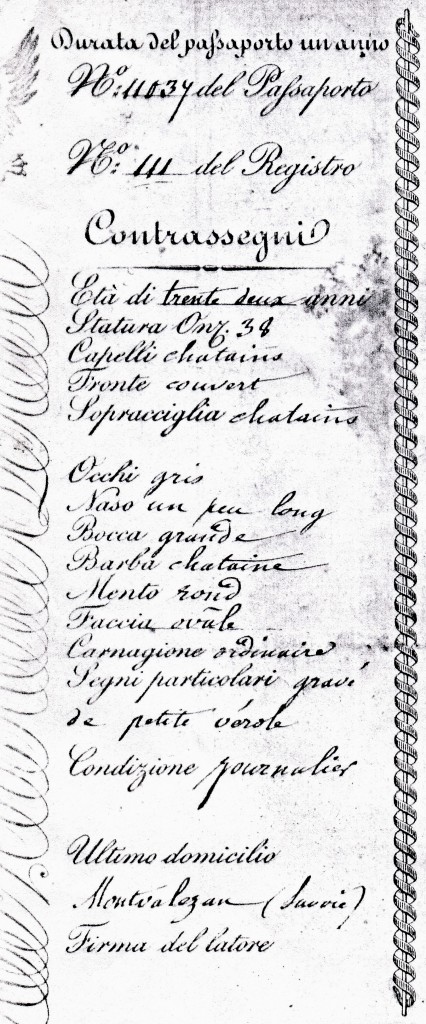Such a strange passeport
In 1842, Pierre Nicolas Berthet, family lineage ascendant and living in Montvalezan (Kingdom of Piedmont-Sardinia), wishes to go to saint Chamond (France) – is it about St Chamond (Loire)? – as labourer and thus requests a passport to go to France.
The 45×30 cm document is really amazing.
The introduction first of all, reproduced below, reminds the formal importance of the regulator of the passport: Louis Clément Solar de la Marguerite, count Solaro ( 1792-1869 ), first secretary of king and friend of the pope. His ancestry is to be found at Soliers’ family (ou de Saliers).

This introduction can be translated this way: “In the name of his majesty King of Sardinia, Us, Don Clément Solar Count of Marguerite, Knight of Big Cross medal recipient of the Big Cordon of the Royal and military Order of the Saint-Maurice and Lazare, Big Cross of saint Grégoire le Grand, the American Royal Order, Isabelle the Catholic and Léopold of Belgium, Knight of the Papal Order of the Christ, First Secretary of State for External Affairs, Solicitor of the Crown, general Superintendent of the Royal Post offices “.
Then the text is wroten half in italian and half in french!
« Accordiamo questo passaporto au nommé Berthet Pierre Nicolas, natif de Montvalezan…. ».(We give this passport to Berthet Pierre born in Montvalezan) We can read first the passport details, then the description: « Età di trente deux anni ; Capelli chatains ; Fronte couvert…. ». (32 years old, brown hair, covered foredge)

The originality of this passport is really due to using both languages for an administrative document.
In the Rivoli edict of September 22nd, 1561, Savoy duke and Prince of Piedmont, Emmanuel-Philibert ( 1528-1580 ), so called “Iron head”, substitutes French for the Latin as the administrative language in the acts of the courts in Savoy and in the Aosta Valley. At the same time, he imposes the Italian in his lands of Piedmont and in the county of Nice. [Carlo Moriondo, Testa di ferro, vita di Emanuele Filiberto di Savoia, Bompiani, Milano, on 1981].
On the XVIth century, French becomes Savoy elite’s language.
To finish, it is written that the validity of the act is of one year and that its cost is of one new lira of Piedmont.



